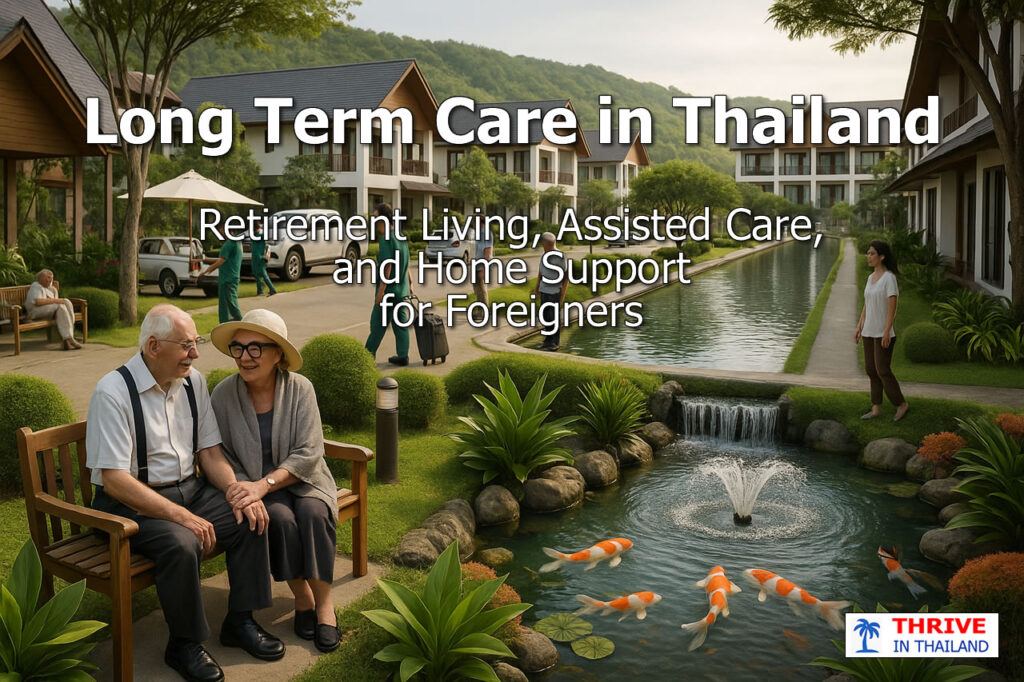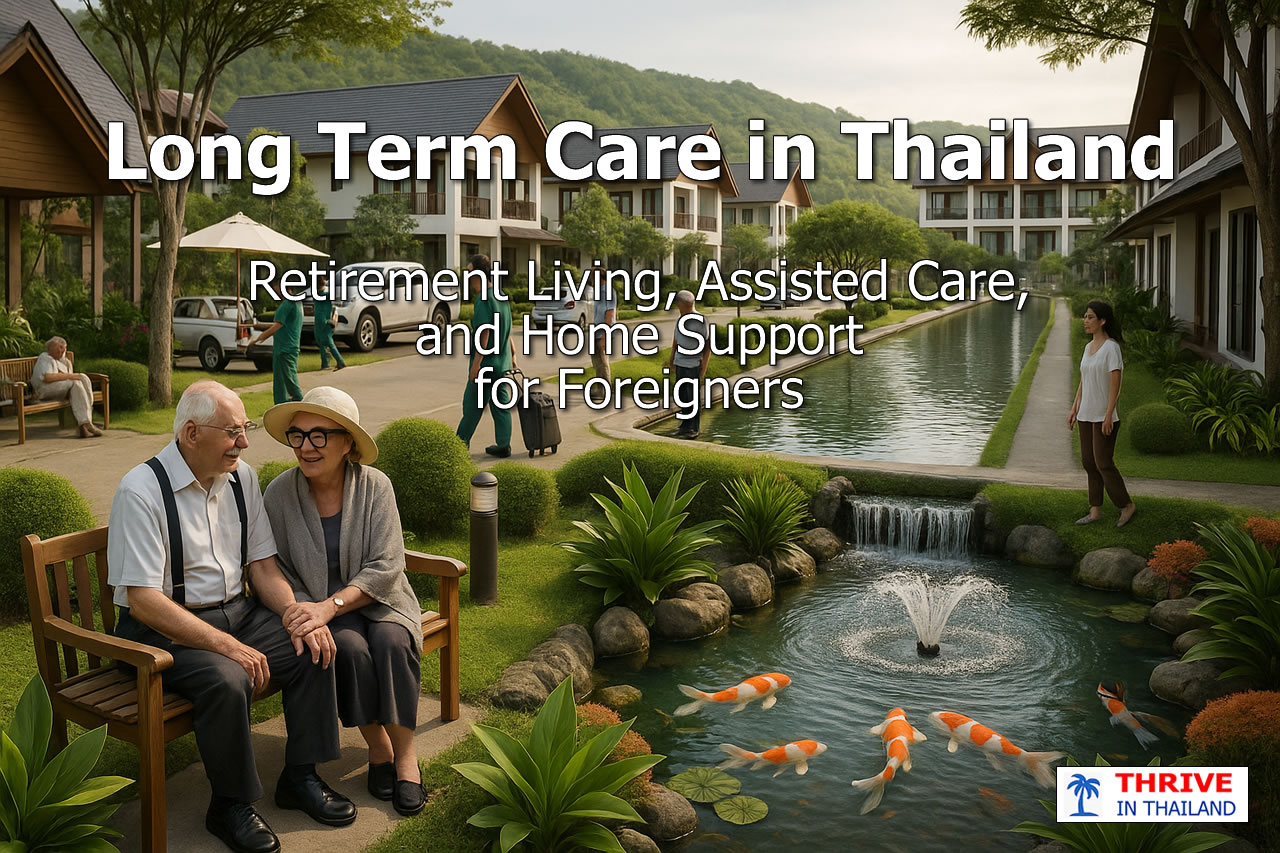
Thailand has grown in popularity as a place for active retirees seeking a comfortable and reasonably priced way to spend their golden years. However, what happens if you require full-time care or assistance with everyday duties and independent living is no longer an option? We want not to have to deal with that situation in the future, so it’s not something we want to worry about too much.
However, if you are making plans in advance or are ready to deal with an unexpected need for immediate treatment, it is always best to be informed. For foreigners who want assistance in their older years, Thailand provides a variety of long-term care options.
From independent retirement villages designed for active seniors to assisted living facilities with personalized support and full-time nursing homes for those requiring constant medical care, the Land of Smiles provides several options at a fraction of Western costs. In this guide, we’ll explore the different types of long-term care available, what to expect, and how to choose the best fit for your needs.
Assisted Living Facilities in Thailand
Assisted living facilities cater to retirees who still maintain some level of independence but require help with daily tasks such as bathing, dressing, medication management, or mobility assistance. These facilities provide a supportive yet comfortable environment, allowing residents to live with dignity while receiving personalized care.
What to Expect in an Assisted Living Facility
Assisted living offers a balance between independence and support, ensuring that residents receive the care they need while maintaining as much autonomy as possible.
Personal Care Assistance
- Help with daily activities, such as bathing, grooming, and dressing.
- Medication reminders and assistance with managing prescriptions.
- Mobility support, including walking assistance and wheelchair accessibility.
Housekeeping & Meal Services
- Daily housekeeping to keep rooms and common areas clean and organized.
- Laundry and linen services for added convenience.
- Nutritious meals, often customizable based on dietary needs, including Thai and Western cuisine.
24/7 Staff Support
- Caregivers and nurses available around the clock for emergency assistance.
- Security and monitoring to ensure resident safety.
- Coordination with nearby hospitals and clinics for specialized care when needed.
Social Activities & Wellness Programs
- Exercise classes, such as yoga, tai chi, and gentle aerobics.
- Social events, including group outings, cultural activities, and music therapy.
- Access to gardens, libraries, and recreational spaces to promote mental well-being.
Pricing for Assisted Living Facilities in Thailand
Assisted living costs in Thailand vary depending on location, level of care, and amenities. Below is a general comparison:
| Facility Type | Monthly Cost (THB) | Monthly Cost (USD) | Inclusions |
|---|---|---|---|
| Basic Assisted Living | 35,000 – 60,000 THB | $1,000 – $1,700 | Private room, daily meals, housekeeping, basic assistance |
| Mid-Range Assisted Living | 60,000 – 100,000 THB | $1,700 – $2,800 | Private villa/apartment, 24/7 caregiver access, wellness programs |
| Luxury Assisted Living | 100,000 – 180,000 THB | $2,800 – $5,000 | Resort-style accommodations, personalized care, premium dining |
Comparison with Western Countries:
- Thailand: Assisted living starts at $1,000/month.
- USA/UK/Australia: Assisted living starts at $3,500 – $7,000/month.
- Savings: Retirees in Thailand can save 50-75% compared to Western prices.
Nursing Homes & Full-Time Elderly Care in Thailand
Nursing homes offer full-time medical supervision and specialized care for seniors with severe medical issues, limited mobility, or cognitive impairments like Dementia or Alzheimer’s. To make sure patients get the care they require, these institutions include emergency response teams, rehabilitation programs, and nurse support around-the-clock.
What to Expect in a Nursing Home
Nursing homes provide a higher level of care than assisted living facilities, catering to residents who require constant medical supervision.
24/7 Nursing Care
- Round-the-clock licensed nurses and trained caregivers.
- Assistance with feeding, mobility, and hygiene for those unable to care for themselves.
Medical Monitoring & Chronic Condition Support
- Regular health check-ups and monitoring of blood pressure, diabetes, heart conditions, etc.
- Specialized dementia and Alzheimer’s care programs.
- Medication management and pain relief treatments.
On-Site Doctors & Emergency Response Teams
- Many nursing homes partner with local hospitals for immediate medical support.
- Emergency response teams handle falls, strokes, and other urgent conditions.
Physical Therapy & Rehabilitation Services
- Physiotherapy and rehabilitation programs for residents recovering from strokes, surgeries, or injuries.
- Mobility assistance programs to prevent bedsores and maintain muscle strength.
Pricing for Nursing Homes & Full-Time Elderly Care in Thailand
For those requiring 24/7 medical care and supervision, nursing homes in Thailand offer affordable yet high-quality services.
| Facility Type | Monthly Cost (THB) | Monthly Cost (USD) | Inclusions |
|---|---|---|---|
| Basic Nursing Home Care | 45,000 – 80,000 THB | $1,300 – $2,200 | Shared room, full-time nursing, meals, hygiene assistance |
| Mid-Range Nursing Home Care | 80,000 – 140,000 THB | $2,200 – $3,900 | Private room, medication management, physical therapy |
| Luxury Nursing Home Care | 140,000 – 250,000 THB | $3,900 – $7,000 | Private villa, concierge healthcare, premium rehabilitation |
Comparison with Western Countries:
- Thailand: Full-time nursing care starts at $1,300/month.
- USA/UK/Australia: Nursing home costs start at $7,000 – $12,000/month.
- Savings: Retirees can save 60-80% by choosing a Thai nursing home.
Where to Retire with Care: Assisted Living & Nursing Homes in Thailand
Thailand offers a variety of retirement villages, assisted living facilities, and nursing homes catering to international retirees. Below is an overview of some notable establishments across the country, along with links to their official websites:
Care Resort Chiang Mai
A luxury retirement facility offering both close care and independent living with comprehensive healthcare services, set amidst expansive gardens and a lake.
Website: www.careresortchiangmai.com
Vivobene Village Chiang Mai
Provides assisted living and care in a luxury resort setting, catering to seniors seeking support in daily tasks or those dependent on care.
Website: www.vivobene.co.th/en/home
Ban Sabai Village Chiang Mai
Offers full care services for seniors, ranging from soft care to 24-hour close care, including specialized care for Alzheimer’s and other dementias.
Website: www.bansabaicare.com
Baan Kamlangchay Chiang Mai
A home for patients with dementia from German-speaking countries, providing personalized care with a high caregiver-to-patient ratio.
Website: www.alzheimerthailand.com
Koh Samui Retirement Village
Premium retirement living retreat set in tropical lush forests, offering quality independent living with services and facilities akin to a boutique hotel.
Website: www.kohsamuiretirementvillage.com
Baan Tschuai Duu Lää by Carewell
A nursing home in Phuket, Thailand, offering 24-hour personalized care for elderly individuals, including specialized services for those with Alzheimer’s and dementia.
Website: www.carewell-service.com
Phuket Retirement Village
Offers a new retirement living experience with excellence in architecture, lifestyle, service, security, and care, providing quality independent living.
Website: www.phuketretirementvillage.com
Elder Blossom Hua Hin
Elder Blossom Hua Hin is a senior living community in Thailand offering long-term residency, personalized care, and a vibrant social atmosphere.
Website: www.elderblossomhuahin.com
Senior Residences by Dhevan Dara Hua Hin
Senior Residences by Dhevan Dara Hua Hin offers long-term and short-term senior accommodations in private pool villas, complemented by personalized care services and a variety of activities.
Website: www.seniorresidencebydhevandara.com/en
Homerly Nursing Living Pattaya
Provides care and rehabilitation for independent and semi-dependent seniors, including intensive care and rehabilitation for dependent and recovering patients.
Website: www.homerlyseniorliving.com
📌 These facilities offer a range of services tailored to the needs of retirees, from independent living arrangements to specialized nursing care. It’s advisable to contact each facility directly to inquire about specific services, availability, and any other important details.
Home Care: Staying Independent with Personalized Support
For expats who prefer to stay in familiar surroundings rather than move to a facility, hiring a qualified caregiver or nurse for in-home care is a viable option in Thailand. This choice allows individuals to maintain their independence while receiving the necessary medical and daily living support.
Types of Home Care Available
Home care services in Thailand range from basic assistance with daily activities to skilled nursing care. Depending on the needs of the elderly individual, options include:
- Personal Care Assistants – Help with bathing, dressing, mobility, meal preparation, and companionship.
- Live-in Caregivers – Full-time attendants who provide round-the-clock support.
- Visiting Nurses – Licensed professionals for medical tasks like wound care, injections, medication management, and physical therapy.
- Palliative & End-of-Life Care – Specialized support for individuals with terminal illnesses who wish to remain at home.
Costs of Home Care in Thailand
The cost of hiring a caregiver in Thailand is significantly lower than in Western countries. While prices vary based on experience, location, and level of care required, general rates are:
1. Basic Caregivers (Non-Medical Assistance)
- ฿15,000–฿30,000 per month ($400–$850)
These caregivers provide non-medical support and are often hired through agencies or directly. Services generally include:
- Help with daily activities (bathing, dressing, toileting)
- Meal preparation and feeding
- Light housekeeping and laundry
- Mobility assistance (e.g., helping with walking or using a wheelchair)
- Companionship and emotional support
- Medication reminders (but not administration)
- Monitoring for safety and well-being
📌 They are not trained for medical tasks. Often best for independent seniors who need some help with daily routines.
2. Live-In Caregivers
- ฿20,000–฿50,000 per month ($550–$1,400)
These are full-time caregivers who live in the home. The cost varies depending on experience, responsibilities, and whether they have any medical training. Services usually include:
- All basic caregiver duties (see above)
- 24/7 availability (though actual working hours should be negotiated)
- Night-time assistance (e.g., bathroom trips, emergencies)
- More personalized care and attention
- Help with errands or accompanying to appointments
- Possibly basic wound care or assistance under nurse supervision
📌 Accommodation and food are usually provided by the employer as part of the arrangement. Not necessarily licensed nurses.
3. Licensed Nurses for Medical Care
- ฿1,500–฿3,500 per visit ($40–$100) OR ฿40,000+ per month for full-time care
These are trained and licensed nurses. The price depends on the complexity of care required. Services typically include:
- Administering medications and injections
- Monitoring vital signs
- Wound care and dressing changes
- Post-surgery or post-hospitalization recovery care
- Catheter and colostomy care
- IV therapy or tube feeding (if needed)
- Coordination with doctors or hospitals
- Health assessments and documentation
📌 For full-time nursing, expect a more structured, medicalized level of care, sometimes arranged through a home health service or private hospital.
✅ Hiring through a reputable agency typically costs more but ensures proper training and background checks.

How to Find Qualified Caregivers in Thailand
Finding a reliable caregiver is crucial. Here are 3 common ways to hire home care services:
1. Private Agencies – Many agencies specialize in elderly care, offering trained nurses and caregivers. Some cater specifically to expats and provide English-speaking staff. Below is a short list of some reputable agencies, along with links to their official websites:
- Health at Home
is a Thailand-based company offering both visiting and live-in care services for individuals at home or in hospitals across the country. Their caregivers undergo professional training and criminal background checks, ensuring reliable and secure assistance. Services include daily living support, medical care, and specialized programs tailored to individual needs. - Ayasan Cares
is a leading elderly care service in Thailand, offering personalized home care provided by professional nurses and caregivers. They offer flexible care durations starting from three months and can match clients with suitable caregivers within five days. Their services are available in Bangkok, Pattaya, Chiang Mai, and Phuket. - Happy Help’s Super Caregivers
are either registered nurses or have completed 420 hours of specialized training certified by the Ministry of Health. They provide compassionate assistance with daily activities such as bathing, meal preparation, medication administration, and offer companionship through activities like outings and shopping trips. Flexible care packages are available, including half-day (4 hours) and full-day (9 hours) options, as well as monthly packages for more permanent assistance.
2. Hospitals & Clinics – Major hospitals often have home care services or can recommend certified caregivers.
3. Expat & Community Networks – Recommendations from fellow expats or local community groups can help find trusted caregivers.
✅ When hiring, it’s essential to check credentials, references, and experience—especially for medical-related care.
Language & Training Considerations
While many professional caregivers receive formal training, English proficiency varies. If communication is a concern, it’s best to request an English-speaking caregiver through an agency or hospital. Alternatively, learning some basic Thai medical terms can help bridge the gap.
Legal & Visa Considerations
If hiring a caregiver privately, ensure proper employment contracts are in place. Foreigners cannot sponsor a work permit for a domestic caregiver, so it’s advisable to hire through agencies that handle legal employment requirements.
Challenges of Long-Term Care in Thailand
While Thailand offers affordable and high-quality elder care, there are still some challenges to consider when choosing a long-term care facility. Understanding these potential hurdles can help retirees and their families make informed decisions and find the best solutions.
1. Limited Availability of Elder Care Facilities
Unlike Western countries where nursing homes and assisted living communities are common, Thailand has a limited number of dedicated elder care facilities. Many retirees struggle to find options, especially outside of major cities like Bangkok, Chiang Mai, and Pattaya.
2. Language Barriers in Care Facilities
While many private hospitals and luxury elder care facilities have English-speaking staff, lower-cost nursing homes and care centers may lack fluent English speakers. This can make communication difficult, especially for retirees who need constant assistance or medical care.
3. Lack of Government Support for Elder Care
Unlike the UK, Europe, or Australia, Thailand does not provide state-funded nursing homes or elderly care programs. This means:
- No government subsidies for senior care.
- No financial assistance for long-term care.
- Private payment required for all elderly care services.
4. Cultural Differences in Elder Care
Thai society places strong emphasis on family-based elder care, which means:
- Many elderly Thais live with their children rather than in nursing homes.
- The concept of retirement villages is still relatively new in Thailand.
- Thai caregiving approaches may be different from Western standards.
For example:
- Thai caregivers may prioritize emotional well-being over strict routines.
- Respect for elders is a major part of Thai culture, but it may differ from Western care structures.
- Some facilities may lack structured activities compared to Western-style nursing homes.
Health Insurance & Long-Term Care Coverage
Health insurance is essential for retirees in Thailand, especially for long-term care. Most expat health insurance plans do not cover nursing homes or assisted living, so long-term care must often be paid out-of-pocket.
However, some high-end international insurance plans may offer:
- Home care coverage (for in-home nursing).
- Hospitalization & rehabilitation benefits.
- Chronic illness management.
Popular Health Insurance Providers for Retirees in Thailand:
- Cigna Global – Offers comprehensive coverage with optional elder care benefits.
- Pacific Cross – Affordable local provider with inpatient & outpatient coverage.
- Luma Health – Focuses on expat-friendly insurance in Thailand.
- April International – Good for long-term expat coverage with global benefits.
📌 Health insurance is a must, but be aware that most policies do not cover long-term elder care. Expect to pay out-of-pocket for assisted living or nursing home services.
Health insurance plays a major role in retirement security—especially as medical needs grow. Find smart coverage options and provider comparisons in my full Thailand Health Insurance Guide.
Thailand is a great retirement destination for healthy, active retirees who want an affordable, comfortable lifestyle, expats with private savings or pensions to cover healthcare costs, and retirees with family support who can help if care is needed later. Thailand offers affordable, high-quality elderly care, and whether you are opting for assisted living or full-time nursing, you don’t have to sacrifice comfort and well-being.
The cost for elderly care in Thailand is much lower than in most Western countries, and you can enjoy a decent and pleasant retirement with dignity. However, long-term care options are still developing, and you need to do your homework before choosing a facility that meets your needs and budget.
💬 Have you or someone you know considered long-term care in Thailand? What were your biggest concerns? Do you think Thailand offers better care options compared to your home country? Every situation is unique. Share your thoughts in the comments below!

